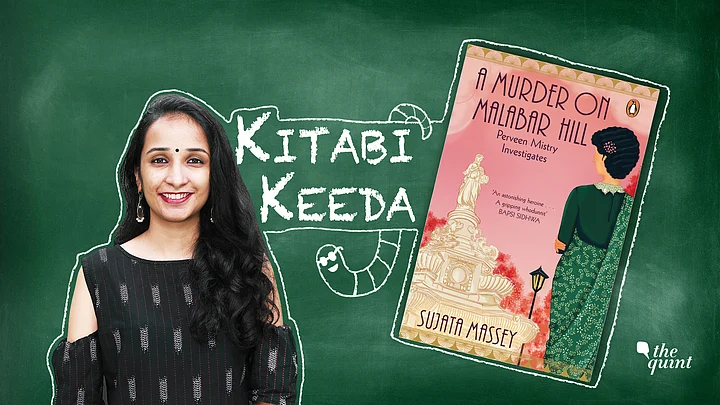- What?
A murder mystery set in 1920s Bombay with a protagonist who, being the first practising woman lawyer in the city, is fighting the fight on two fronts — crime & gender discrimination. - Whom is it for? The crime fiction reader looking to get an Indian fix and a reminder on how messed up things were for women in 1920s India. Yes, even with the despair that is 2018.
It's been an exhausting week for women everywhere.
In India, Twitter timelines and TV channels are dominated by Tanushree Dutta's allegations of sexual harassment against Nana Patekar — and the relentless ‘whataboutery’ that comes with it. (“Why didn't she report earlier?”) Tune out of Indian news long enough, and you're faced with the heartbreaking deposition of Dr Christine Blasey Ford. Ford sat in front of a row of mostly male Senators; who grilled her on her memory of a sexual assault by Supreme Court Nominee Brett Kavanaugh. Amidst this despair, it’s a welcome break to read about the adventures of Perveen Mistry in Sujata Massey’s ‘A Murder on Malabar Hill.’
Inspired partially by Cornelia Sorabji – who was the first female advocate in India – Perveen Mistry has to struggle to establish herself as a female lawyer in 1920s Bombay. Despite a law degree from Oxford and a sharp mind, she isn’t taken seriously by most prospective clients – until a property dispute leads to a murder in a women’s zenana. Suddenly, her gender becomes an advantage; allowing her to don the cap of a detective and prove herself as a formidable lawyer.
The Body in a Zenana: A Feminist Indian Crime Story
Did you know that some families in the Parsi community in 1920s in India used to practice confinement of women during menstruation? Or that if you were a woman who wanted to study law in India, you’d need special permission since you would be the first? Or that if you’re a woman, you could hardly roam the streets of Mumbai, alone and without a male escorting you?
Nostalgia colours everything rosy; especially the past. So, when we look at the past in India, we see the black-and-white Parsi fashions but forget that the women in these photographs didn’t have much by way of personal freedom. Historical fiction often falls in the nostalgia trap, but ‘A Murder on a Malabar Hill’ is an exception.
Much of the conventional crime thriller tropes like the discovery of a bloody body and the family where everyone is under a cloud of suspicion are there in the book. But these crime-fiction tropes are underlined by the stifling patriarchy that the women in the book have to tolerate. So, Perveen Mistry discovers the body, but in a women’s zenana, and is tasked with interviewing three wives of the murdered Omar Farid; all of them in a purdah and all with a motive for murder. For instance, this is the moment Perveen discovers a murder:
“Perveen glanced towards the brass jali that Sakina had said was the conversation place between the zenana and main house. If Mr Mukri chose to eavesdrop, he could only do so from there; that was the likely reason the wives were speaking in Razia’s faraway bedchamber rather than Sakina’s closer quarters. As Perveen studied the patterned brass border, a smear of red caught her eyes.”
In sharp contrast to the Poirots and Feludas of the world, who roam the streets with abandon, looking for clues, Perveen Mistry needs a chaperone when investigating. While the streets of Bombay are familiar to her, she is haunted by the possibility of her abusive ex-husband making a return and snatching everything she has worked for. With a bitter divorce behind her, where she felt the full impact of the unfairness of Parsi Marriage laws, Mistry is keenly attuned to the suffering of women around her – especially the three wives of Omar Farid for whom the outside world is an unfamiliar beast.
The world in ‘A Murder on Malabar Hill’ constantly undermines its women – restricting their movements on Marine Drive (which we in 2018, take for granted), proving that no amount of education in the Parsi community can compete with traditions like menstrual confinement and the imposition of nonsensical rules.
But Perveen Mistry, her friend Alice and the Farid widows – Razia, Mumtaz and Sakina – have other plans. They are feisty, brave, witty and not in the mood to let their lives be dictated by anyone. In 2018, where everywhere I turn, women’s voices are being ignored or at worst, dismissed, reading about these women felt like an initiation into an ancient sisterhood; one which is both comforting and inspiring.
When Alice and Perveen sit in the Taj Mahal hotel and defiantly toast their drink (women guests were not allowed to drink at that time) and say “to the power of women!” it feels like a clarion call.
Even if we have no bloody murder mystery to solve.
Title: A Murder in Malabar Hill
Author: Sujata Massey
Genre: Indian Crime Fiction
Number of pages: 440 pages
Price of Paperback/Kindle: Rs 329/Rs. 216
(Kitaabi Keeda is a fortnightly column where we review books for the reader who wants to get back to reading but only has a weekend — or maybe some hours in a day — to spare. Reading is for everyone, and we’re just about to tell you how.)
